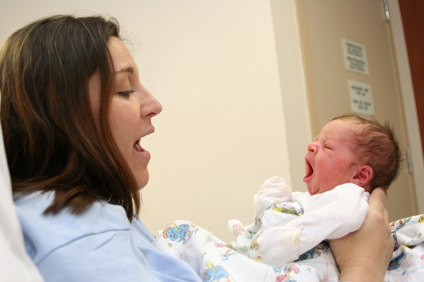Scientists probing the epigenetic changes surrounding birth have made a startling finding. Hospital birth leads to babies that are cuter and smarter!
What are epigenetic changes?
For years we have believed that all human traits are fully encoded in DNA and that environment has no impact on genetic characteristics. Recent research has shown, however, that the expression of certain genes can be modified by chemical changes that in turn are affected by environment. For example, children who live through famine grow up to be adults more likely to gain weight when adequate food is present. Furthermore, that this tendency to gain weight in the presence of adequate food can be inherited by offspring. Epigenetics allows for carefully calibrated expression of the genes that help an organism make the best possible use of the environment in which it finds itself.
Midwives and other natural childbirth advocates have seized upon epigenetics as a way of demonizing the interventions of modern obstetrics, arguing that hospital birth leads to epigenetic changes that cause obesity, diabetes, cardiac disease and other 21st Century ills of old age. But recent research has found precisely the opposite. The epigenetic changes of hospital birth are beneficial. Indeed, the epigenetics of hospital birth lead to babies that are cuter and smarter.
It’s not really surprising when you think about it. We don’t yet know very much about epigenetics, but we do know this: epigenetic changes allow the organism to better exploit its environment. As the example of famine shows, the epigenetic changes allowed individuals in a food poor environment to better exploit the small amount of food that was available by avidly scavenging every possible calorie from it. Yes, it is true that the epigenetic changes were no longer beneficial, and perhaps even harmful, if they were inherited by offspring whose environment was radically different, but the changes were certainly beneficial to the people who experienced them.
That’s why the prattling of midwives and natural childbirth advocates that the interventions of modern obstetrics cause harmful epigenetic effects makes no sense at all. To date we have found no evidence that epigenetic changes lead to unrelated harmful effects, or lead to harmful effects for offspring who live in a similar environment. There is no reason to believe that any epigenetic changes caused by C-sections or other obstetric interventions would lead to the diseases of old age found modern societies. That’s yet another pathetic effort by midwives to demonize any interventions that they cannot provide.
So how do the interventions of the hospital change the epigenetics of babies? According to Professor Gull E. Bull, the latest research indicates that the human body recognizes the environment of the hospital as an indication of superior attachment between mother and infant. Women who choose hospital birth value their children more than women who choose homebirth. Prof. Bull explains that as a result of this superior bond, babies are able to express their genetic intelligence and beauty to the fullest extent, leading to babies that are cuter and smarter than babies who are born at home. And because these are epigenetic changes, the grandchildren of those who choose hospital birth are cuter and smarter as well.
For example, the picture of the C-section born baby above demonstrates not only the superior bond between this mother and infant, but the fact that this baby is smart enough to talk and have a complete conversation with its mother at only 2 days old. No homebirth mother, no matter how much she “rocked” her vaginal birth, can make that claim about her baby.
As Prof. Bull notes, there is a tendency to view each new scientific discovery as the “explanation” for diseases with unknown cause, like autism, or diseases of old age that are found in wealthy societies. In the case of epigenetics, however, the changes occur because they benefit the organism. While they could potentially cause problems in offspring one or more generations removed, that would only happen if the environment were radically different. Therefore, the epigenetic changes associated with the interventions of modern obstetrics can all be expected to be beneficial to the organism that experiences the epigenetic changes.
The concern that a mother displays in choosing to give birth to her child in a hospital actually affects the expression of the child’s DNA, leading to cuter, smarter babies. Of course, that’s not why women choose hospital birth; they do so because they value the health of their child over their own birth “experience.” The fact that the healthy baby is cuter and smarter is just an unexpected bonus.
This piece is satire, but could ultimately turn out to be true.


